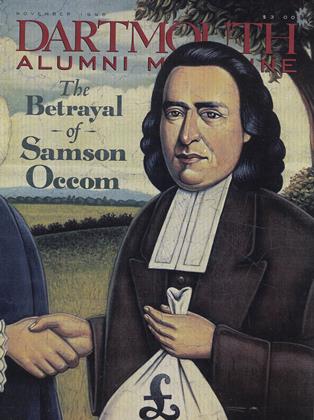An Env Tension
"Dartmouth's history is one that resonates and lives, not one that encapsulates and confines" says new President James Wright.
SEPTEMBER 23 WAS A PERFECT DAY FOR MAKING HISTORY. Overnight a cold front had blown out the lingering dampness of late summer. The sharp air and blue skies added clarity to the proceedings, as if to remind everyone it was time to get back to work. This wasn't, however, a routine Convocation ceremony. James Wright had chosen the College's 229th Convocation as the day he wanted to be inaugurated as Dartmouth's 16th president.
Accepting the presidency last April Wright had remarked that Dartmouth was a university in all but name. Keenly aware how those words had echoed among students, faculty, and especially alumni, Wright used his inaugural address to speak to each of those constituencies. His speech explained how the historical tensions between Dartmouth as a small liberal arts college and its aspirations to be a research university afford the College an opportunity to continue to build on what it does best. Said Wright, "What was true in President Dickey's day is even more true today. If neither of the descriptive labels college or university fits us easily, that is eminently acceptable, because we are comfortable with what we are and with what we aspire to be. Typically colleges are primarily concerned with undergraduate education and teaching. Universities are primarily engaged in graduate education and also place a greater emphasis on faculty research. We at Dartmouth are proud to call ourselves a college, recognizing that Dartmouth is a college that has many of the best characteristics of a university. We are a university in terms of our activities and our programs, but one that remains a college in name and in its basic values and purposes. In this paradox, in this tension, lies our identity and our strength."
Wright also used his speech to allay fears about the future by paying homage to the College's collective past. "This ceremony affords a rare opportunity and for a historian it constitutes an obligation to consider the values that, ingrained in Dartmouth's past, define the institution today, and to ask how that past informs our future. We all know that Dartmouth is a place that is marked by strong traditions."
The crowd, estimated at more than 4,000, listened as Wright reiterated the benefits of Dartmouth's small size and how that small size promotes a larger purpose—a synergy between the undergraduate College and the graduate schools. "Interdisciplinary work is strong here because of our size and we will make it stronger. We need to build upon our core distinction in the Arts and Sciences. The professional schools can serve as a greater resource to the College even as the College can be a greater resource for them."
Toward the end of his remarks Wright spoke directly to alumni concerns. "You too can take pride that the undergraduate program that will remain at the heart of this Col lege is envied by many and is second to none. It means that you can take pride in the fact that your alma mater is enriched and enhanced by the presence of three of the oldest professional schools in their respective disciplines. It means that the whole institution benefits from the presence of select graduate programs within the sciencessmall programs, excellent in their own right, that enrich and enhance the entire institution. It means that you have a justifiable pride in the scholarly accomplishments of this faculty. As alumni and alumnae, your loyalty to Dartmouth your support, your enthusiasm have always been, and will continue to be, integral to the College's success."
Even before the day's main event, Wright had sent a symbolic message about Dartmouth's tradition of community. His office invited everyone to a barbecue on Tuck Mall. And everyone showed up. In the two hours before Convocation they consumed 200 gallons of chili, 5,000 hot dogs 5,000 hamburgers, and 4,000 Rice Krispies Treats. Wright mixed easily with the crowd of students, faculty, administrators, townspeople, presidents emeriti, and Trustees, both former and current. He was easy to spot. At six-foot-four he stood a head above all but the tallest of the well-wishers greeting him and being greeted by him.
After lunch the brassy strains of Jeremiah Clarke's "Trumpet Voluntary" called in the academic procession, which was led jauntily by acting Dean of the College Dan Nelson '75. A record 228 faculty marchers representing the undergraduate College and the professional schools sat in colorful robes and regalia. Honored guests included historian John Hope Franklin and delegates from 58 educational institutions.
Three standing ovations for Wright punctuated the proceedings, and one ovation interrupted his remarks—when he announced that, in addition to being president, he would be returning to the classroom to teach during winter term. At the end of his speech, the freshman president turned to the freshman class. "We have work to do, members of the class 0f 2002. We have work to do, you and I and it is time to begin."
Wright became the newest holder of the 1772 Wentworth Bowl.
The inaugural speech and related links can be found at .
 View Full Issue
View Full Issue
More From This Issue
-
 Feature
FeatureThe Betrayal Of Samson Occom
November 1998 By Bernd Peyer -
 Feature
FeatureThe Mystery of the Tao
November 1998 By Rebecca Bailey -
 Feature
FeatureSails for the America's Cup
November 1998 By Fred Hapgood -
 Article
ArticleThe Problem with Romantics
November 1998 By Kathleen Burge '89 -
 Class Notes
Class Notes1979
November 1998 By Jeffrey D. Boylan, R. James "Wazoo" Wasz -
 Article
ArticleThe Last Adventure
November 1998








